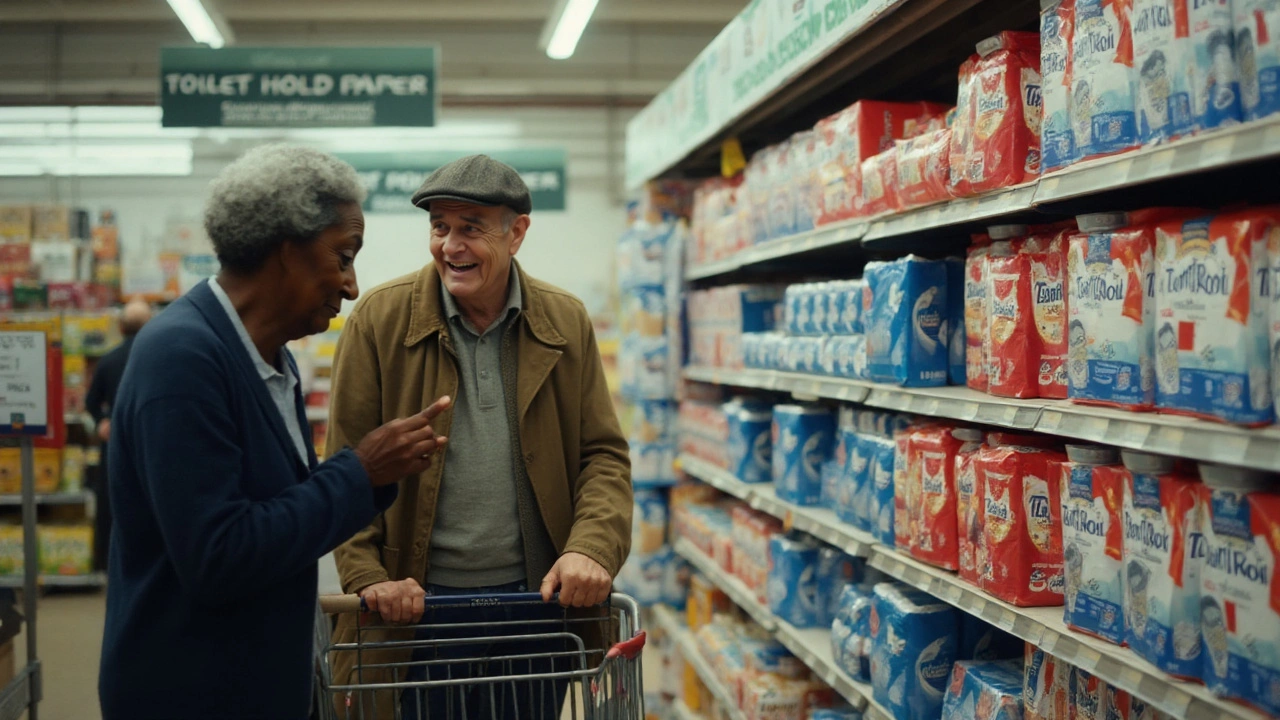What Do Brits Call Toilet Paper? Toilet Roll, Loo Roll, and Bog Roll Explained
 Sep, 6 2025
Sep, 6 2025
You clicked because you want the straight answer without wading through fluff. Here it is: in the UK, people most often say toilet roll or loo roll, and casually, bog roll. Toilet paper is understood too, but it sounds a bit more American or “label on the pack.” I’ll give you the quick hits first, then show you when to use each term, how polite they sound, and the little quirks you’ll actually hear on British streets and in British shops.
- Toilet roll and loo roll are the most common everyday terms in the UK.
- Bog roll is slang-fine among friends, not great at work or in posh settings.
- Toilet paper and toilet tissue appear on packaging and in formal writing.
- At the supermarket, you’ll often see “toilet tissue” as the category label.
The quick answer Britons actually use
If you’re in Britain and need to ask for it, say toilet roll or loo roll. Both sound normal in a home, a pub, a shop, or a friend’s flat. Bog roll is common slang-funny to some, crude to others. If you want to play it safest anywhere, you can just say toilet roll.
Toilet paper isn’t wrong, and people won’t blink, but it feels more like product-speak or something you’d read on a package. Many UK retailers and manufacturers use toilet tissue as a formal label. In everyday chat-at least in my London world-loo roll has an easy, friendly sound. As a test: if I text a mate, I write “Grab loo roll.” If I’m typing a shopping list for delivery, I might add “toilet tissue” because that’s how the category is often named online.
Where does loo come from? Etymologists debate it. You’ll hear theories: an echo of the old Scottish warning cry gardyloo (from French, referring to tossing waste), the French lieux (places), even a nod to l’eau (water). Whatever the roots, loo is the everyday British word for the toilet. Bog is older slang-earthy and, in some ears, a bit gross. So bog roll carries that same tone.
When to say toilet roll, loo roll, or bog roll (and when to avoid them)
Different settings call for different levels of formality. Think of it like choosing trainers vs dress shoes. Here’s how to pick the right term quickly.
- At home or with friends: Say loo roll or toilet roll. If your group loves a laugh, bog roll will land fine.
- At work or with people you’ve just met: Say toilet roll. It’s neutral and safe.
- In shops or customer service: Use toilet roll or toilet tissue. Staff will understand both.
- In writing (emails, signs): Toilet roll or toilet tissue. Avoid slang.
- With kids: Loo roll is simple and common; kids hear “loo” a lot here.
When I’m walking my dog, Charlie, and pop into the corner shop, I’ll ask, “Got any loo roll?” If I’m emailing the office admin, I’ll write, “Could we add toilet roll to the supplies order?” Same item, different tone. It’s not a big deal, but it reads the room.
Some Brits also use brand names as shorthand. Andrex-the big puppy-on-the-pack brand-occasionally stands in for the product in chat (“We’re out of Andrex”). It’s the UK cousin of Americans saying “Kleenex” for tissues. Still, most people just say roll.
| Term | Register | Where you’ll hear it | Good choice when… | Avoid if… |
|---|---|---|---|---|
| Toilet roll | Neutral | Homes, offices, shops, media | You want the safe, standard option | - |
| Loo roll | Casual | Everyday chat, texts, social posts | You’re with friends/family, informal vibe | A formal email, public signage |
| Bog roll | Slang | Pubs, mates’ banter, comedy | Everyone’s on the same casual wavelength | Work, polite company, strangers |
| Toilet paper | Neutral-formal | Packaging, articles, non-UK English | You want to be clear to any English speaker | You’re mimicking local casual speech |
| Toilet tissue | Formal/product | Supermarket categories, invoices | Shopping lists, procurement | Chit-chat with friends |
If you like rules of thumb: for a person-say roll; for a product-say tissue; when you are with strangers-avoid slang.
Regional quirks, generational habits, and small culture notes
You don’t need a dialect map to get this right, but you’ll hear tiny differences across the UK.
- England (general): Toilet roll and loo roll everywhere. Bog roll is common slang in cities and small towns alike.
- Scotland: Loo and toilet both work; bog is known but register varies by crowd. You may hear gardyloo stories in school, but the cry itself is history.
- Wales and Northern Ireland: Same core pattern-roll beats paper in speech; bog is slang, not for formal use.
Generationally, older speakers often stick to toilet roll, and are likelier to avoid bog roll unless joking. Younger speakers happily mix loo roll in casual chat and will use bog roll with friends who share their tone. None of this is rigid. It’s more vibe than rule.
One more cultural bit: Brits are straightforward with the word toilet compared with many Americans, who lean on bathroom or restroom. In the UK, asking “Where’s the toilet?” is normal. Ask “Where’s the restroom?” and people will get it, but they’ll clock it as American. That’s why toilet roll sounds so native here.
If you’re learning English or visiting, don’t stress. Brits recognise all the variants. The only real tripwire is using bog roll in the wrong room-like a work meeting. It can land as crass, the way some American slang can jump the rails at the office.

Shopping labels, brands, and what’s on the shelf
Here’s how this plays out when you actually buy the stuff. UK supermarkets and chemists tend to group it under toilet tissue or toilet roll. Product pages and receipts often say toilet tissue. On the pack, you’ll still see “toilet tissue,” “premium soft,” “recycled,” “2-ply,” “3-ply,” “shea butter,” and so on. You’ll also spot common SKUs like “9 roll,” “16 roll,” or “mega roll.”
Brand names you’ll see include Andrex, Cushelle, Velvet, and supermarket own-brand ranges (e.g., “Luxury Soft,” “Quilted,” “Recycled”). If someone says, “We need more Andrex,” they’re likely using brand shorthand for toilet roll. It’s not universal, but it’s understood-especially because Andrex ads are part of the cultural wallpaper here.
If you’re ordering online for delivery, searching “toilet roll” will find the right aisle. If you don’t get many hits, try “toilet tissue.” Price-wise, UK shoppers often compare cost per 100 sheets rather than price per roll, because roll sizes vary. A “mega roll” can hide fewer rolls but similar total sheets, so unit pricing helps you compare.
- Quick buying tip: Compare like-for-like on ply (2-ply vs 3-ply), sheet count per roll, and total sheets per pack. Don’t let “mega” or “ultra” distract you.
- Eco tip: Recycled or bamboo options are common. They’re usually marked clearly as such on UK shelves.
In a pinch at a small shop, you can ask, “Do you have any loo roll?” Staff will point you to the right shelf instantly. If you’re nervous, swap it to toilet roll and you’re covered in any setting.
US vs UK phrasing, simple examples, and your cheat sheet
Here’s where American and British usage part ways slightly. Americans often say bathroom or restroom for the room and toilet paper for the product. Brits say toilet for the room and roll (toilet roll or loo roll) for the product. That’s it. The difference is tiny but it’s enough to make your speech sound local.
Try these real-life lines you can borrow:
- At home: “Could you grab another loo roll from the cupboard?”
- With colleagues: “We’re out of toilet roll in the downstairs toilet.”
- In a shop: “Hi-where are the toilet rolls, please?”
- With mates (slangy): “We’re low on bog roll-add it to the shop?”
- On a list: “Toilet tissue, 9-roll, 3-ply.”
And here’s your quick cheat sheet to keep on your phone. It’s the fast way to remember the best phrase for the situation.
- Default safe pick: toilet roll.
- Casual and friendly: loo roll.
- Slang with a wink: bog roll (avoid at work).
- Product/packaging: toilet tissue (or toilet paper).
- Asking for the location: “Where’s the toilet?” not “restroom.”
Language reference note: Dictionaries like the Oxford English Dictionary, Collins, and Cambridge mark bog as informal/slang and recognise loo as standard British English. Corpora such as the British National Corpus and the News on the Web corpus show toilet roll and loo roll widely used in UK contexts, with toilet tissue frequent on product pages. You don’t need the datasets to use the words, but they back up what your ear will hear on the ground.
If you came here wondering the single best phrase to use universally, choose toilet roll. If you want to sound like you live here, you’ll naturally switch to loo roll around friends. And if you like a bit of cheek, save bog roll for people who share your humour.
One last nudge for clarity: if you’re writing for an international audience-say a hotel manual-use toilet paper on first mention and note the UK term in brackets: “toilet paper (UK: toilet roll).” That way everyone’s aligned.
I promised simple and practical, so here’s the ultimate rule: When in doubt, match the room. If you’re in a meeting, you’re on “toilet roll.” If you’re on the sofa with friends and a dog named Charlie is noisily destroying the last sheet in the bathroom, say “loo roll”-and maybe invest in a cabinet he can’t open.
For searchers who needed the term itself for copy or a script, here are quick plug-and-play snippets you can paste:
- British casual: “Can you buy some loo roll?”
- British neutral: “We need more toilet roll.”
- Product label: “Soft toilet tissue (3-ply).”
- Slangy joke: “It’s a bog roll emergency.”
That covers the living language. And if you wanted the phrase for SEO, here it is one more time with the words in order: the British term for toilet paper most people use is “toilet roll,” with “loo roll” common in casual speech and “bog roll” as slang.
FAQ, quick fixes, and next steps
Mini-FAQ
- Is “toilet paper” wrong in the UK? No. It’s clear and fine. It just sounds a bit more like packaging than everyday chat.
- Is “bog roll” offensive? It’s slang and can sound crude. With friends, it’s usually fine; at work or with strangers, avoid.
- What do shops call it? Often “toilet tissue” for the category and “toilet roll” on promos. Both are clear.
- Do Brits ever say “bathroom tissue”? Rarely. That’s more North American branding.
- What’s the most local-sounding phrase? “Loo roll” among friends; “toilet roll” in neutral settings.
Troubleshooting by scenario
- Tourist in a pub: Ask, “Sorry-where’s the toilet?” If you need supplies: “Do you have spare toilet roll?”
- Workplace notice: Write, “Please restock toilet roll in the upstairs toilet.” Clear, neutral, polite.
- Parent with small kids: “We keep loo roll under the sink.” Kids hear “loo” all the time in UK shows and books.
- International copywriter: First mention “toilet paper,” then note (UK: “toilet roll”) to avoid confusion.
Next steps if you care about sounding local
- Use “toilet roll” as your default anywhere public.
- Switch to “loo roll” with friends and family if it feels natural.
- Reserve “bog roll” for banter only.
- When shopping online in the UK, search “toilet tissue” or “toilet roll.”
- Asking directions? Say “toilet,” not “restroom.”
If you wanted just one sentence to leave with: In Britain, say toilet roll in public, loo roll with friends, and bog roll only when everyone’s in on the joke.